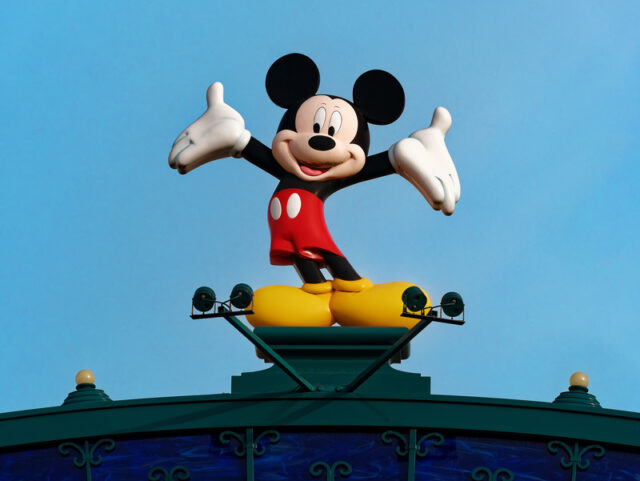
BY ANDREW DALTON
M-I-C-K-E-Y will soon belong to you and me.
With several asterisks, qualification and caveats, Mickey Mouse in his earliest form will be the leader of the band of characters, films and books that will become public domain as the year turns to 2024.
In a moment many close observers thought might never come, at least one version of the quintessential piece of intellectual property and perhaps the most iconic character in American pop culture will be free from Disney’s copyright as his first screen release, the 1928 short “Steamboat Willie,” featuring both Mickey and Minnie Mouse, becomes available for public use.
“It’s sometimes derisively referred to as the Mickey Mouse Protection Act,” Jenkins said. “That’s oversimplified because it wasn’t just Disney that was pushing for term extension. It was a whole group of copyright holders whose works were set to go into the public domain soon, who benefited greatly from the 20 years of extra protection.”
Current artists and creators will be able to make use of Mickey, but with major limits. It is only the more mischievous, rat-like, non-speaking boat captain in “Steamboat Willie” that has become public.
“More modern versions of Mickey will remain unaffected by the expiration of the Steamboat Willie copyright, and Mickey will continue to play a leading role as a global ambassador for the Walt Disney Company in our storytelling, theme park attractions, and merchandise,” Disney’s statement said.
Not every feature or personality trait a character displays is necessarily copyrightable, however, and courts could be busy in the coming years determining what’s inside and outside Disney’s ownership.
“We will, of course, continue to protect our rights in the more modern versions of Mickey Mouse and other works that remain subject to copyright,” the company said.
Disney still solidly and separately holds a trademark on Mickey as a corporate mascot and brand identifier, and the law forbids using the character deceptively to fool consumers into thinking a product is from the original creator. Anyone starting a film company or a theme park will not be free to make mouse ears their logo.
Disney’s statement said it “will work to safeguard against consumer confusion caused by unauthorized uses of Mickey and our other iconic characters.”
“Steamboat Willie,” directed by Walt Disney and his partner Ub Iwerks and among the first cartoons to have sound synced with its visuals, was actually the third cartoon featuring Mickey and Minnie the men made, but the first to be released. It features a more menacing Mickey captaining a boat and making musical instruments out of other animals.
In it, and in a clip from it used in the introduction to Disney animated films in recent years, Mickey whistles the 1910 tune “Steamboat Bill.” The song inspired the title of the Buster Keaton film “ Steamboat Bill Jr,” released just a few months before “Steamboat Willie,” which in turn may have inspired the title of the Disney short. The copyright wasn’t renewed on the Keaton film and it’s been in the public domain since 1956.
Young Mickey could get the same treatment.
“Now, the audience is going to set the terms,” said Cory Doctorow, an author and activist who advocates for broader public ownership of works.
Jan. 1, 2024, has long been circled on the calendars of public domain watchers, but some say it serves to show how overlong it takes for U.S. works to go public, and many properties with less pedigree than Winnie or Minnie can disappear or be forgotten with their copyrights murky.
Other properties entering the U.S. public domain are Charlie Chaplin’s film “Circus,” Virginia Woolf’s novel “Orlando” and Bertolt Brecht’s musical play “The Threepenny Opera.”
The current copyright term passed in 1998 brought the U.S. into closer sync with the European Union, making it unlikely Congress would extend it now. There are also now powerful companies, including Amazon with its fan-fiction-heavy publishing arm and Google with its books project, that in some cases advocate for the public domain.
“There’s actually more pushback now than there was 20 some years ago when the Mickey Mouse act was passed,” said Paul Heald, a professor at the University of Illinois College of Law who specializes in copyright and international intellectual property law.
In some instances, the U.S. goes well beyond Europe, and maintains copyright on work that is already public in its country of origin, though international agreements would allow the U.S. to adopt the shorter term of other nations on work produced there.
The books of George Orwell for example, including “Animal Farm” and “1984,” both published in the 1940s, are now public domain in his native Great Britain.
“Those works aren’t going to fall into the public domain in the United States for 25 years,” Heald said. “It would be literally costless for Congress to pass a law saying, ‘we now adopt the rule of the shorter term,’ which would throw a butt ton of works into the public domain over here.”
___
This story has been corrected to reflect that Eugene O’Neill’s play “Long Day’s Journey Into Night” is not yet entering the public domain.
Disclaimer
The information contained in South Florida Reporter is for general information purposes only.
The South Florida Reporter assumes no responsibility for errors or omissions in the contents of the Service.
In no event shall the South Florida Reporter be liable for any special, direct, indirect, consequential, or incidental damages or any damages whatsoever, whether in an action of contract, negligence or other tort, arising out of or in connection with the use of the Service or the contents of the Service. The Company reserves the right to make additions, deletions, or modifications to the contents of the Service at any time without prior notice.
The Company does not warrant that the Service is free of viruses or other harmful components












